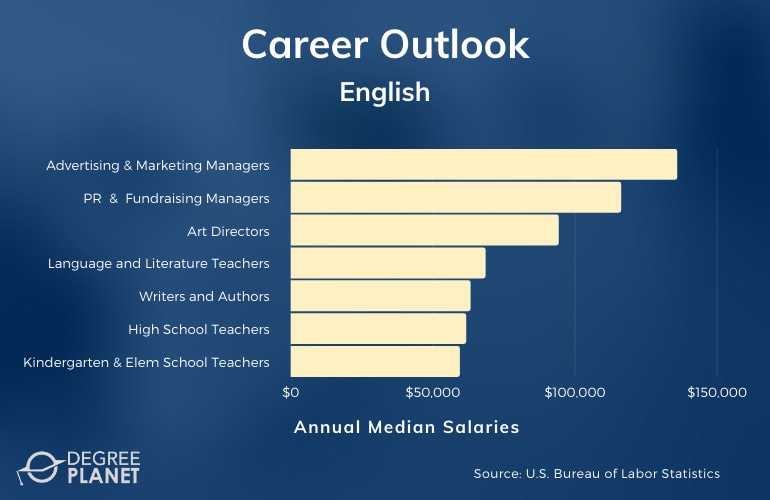Is a masters in English worth it? A higher-level degree may not only strengthen your skills in everything from textual analysis to rhetorical criticism but may also qualify you for higher-level jobs.

Editorial Listing ShortCode:
There are even online English programs that offer evening, hybrid, and summer classes for busy students on the go.
Is a Masters in English Worth It?

Yes, a master’s degree in English is worth it for many students. The Bureau of Labor Statistics is projecting 4% growth in media and communication occupations over the next 10 years.
Common careers in this field include writer, teacher, publisher, office administrator, and advertising agent. One of the most common paths for English students is education and librarianship. These careers may include everything from professors and archivists to historians and museum curators.
Another popular path for English majors is arts and media. You may work on films and video games. You may publish books, create commercials, or share breaking news stories with the world.
Editorial Listing ShortCode:
You may even go into the business field with either a campus-based or online English degree. If you are creative, for example, you may harness your ideas as a marketing or promotions manager. Those with strong communication skills might become speechwriters, social media managers, or public relations experts.
Master’s-level English credentials may also open up opportunities for career advancement and higher earning potential, making English a good major for many students.
How to Decide Whether a Masters in English Is Right for You

English can be an excellent field of study, but it isn’t for everyone. You may take a look at the following statements to see if any of them describe you.
1. You want a degree that can be applied to many different industries.
Rather than being a specialized degree that prepares you for a specific job, an English degree is considered a generalist degree that may qualify you for many different careers.
It’s a strategic choice for someone who isn’t sure what they want to do just yet and wants to keep their options open.
2. You want to hone your reading, writing, or researching skills.

At the master’s level, an English degree often involves a lot of research and analysis. Your classes might cover modern rhetoric, composition theory, multi-ethnic literature, and linguistic history of English.
If you specialize in something like technical communication, you may also be expected to study specialized topics, such as typographical systems and verbal data analysis.
3. You want a flexible foundation for further study.

It’s quite common for English majors to study another topic at the master or doctorate level. For example, if you want to be a literature teacher, you might study education as an undergrad and literature as a postgrad.
Others might want an English masters degree as a springboard for law school or a linguistics PhD. Since it’s such a broad field, it generally makes a good foundation for those who want to keep studying in the future.
5 Things You Can Do with a Masters in English

While there are many potential career paths for English majors, some are more common than others.
1. Teacher
This is one of the most well-traveled paths for English majors, especially those who want to teach English-related subjects, like literature or creative writing.
Average salaries can range from $60,660 per year for early childhood educators to $79,740 per year for local junior college professors (Bureau of Labor Statistics). Many English graduate programs may also qualify you for work in other educational fields, such as administration or instructional coordination.
2. Writer

Writers can range from fictional storytellers to technical or scientific copywriters. They may also work in similar fields related to editing, publishing, producing, or translating. Other options include journalism, reporting, announcing, or broadcasting.
The average salary for a writer is $67,120 per year, but everyone dreams of snagging a multi-million dollar book deal (Bureau of Labor Statistics).
3. Human Resources
Human resources (HR) careers are usually divided into sub-categories, like “benefits and compensation” and “training and recruiting.” All of them, though, may utilize the analytical and organizational skills of English majors.
Editorial Listing ShortCode:
Office administration isn’t an uncommon career path for this degree, and it’s actually one of the most highly paid. Human resources managers make an average of $121,220 per year, and the top earners in the field can take home more than $208,000 per year (Bureau of Labor Statistics).
4. Librarian
Becoming a librarian is more difficult than it might seem. For example, most libraries will want an actual degree in library science or information systems.
An English degree, though, may get you started down the right path, and it may also lead to library-adjacent careers, such as administrator, publishing agent, or information systems manager. The average salary for librarians is $60,820 per year (Bureau of Labor Statistics).
5. Arts or Media Coordinator

Arts and media coordinators may have a wide range of responsibilities. For example, they might be marketing directors in one organization and social media managers in another.
As befitting their flexible jobs, their salaries can vary greatly as well, but art and design occupations in general have an average salary of $49,600 per year (Bureau of Labor Statistics). Art directors, meanwhile, make an average of $97,270 per year.
Master’s in English Degree Alternatives

Here are a few potential degree alternatives in fields of study in related disciplines:
- Master’s in Publishing or Writing. This is usually called a Master of Fine Arts, and it may teach you the basics of the industry as well as fine-tune your creative skills.
- Master’s in Communications. A communications degree can help prepare you for jobs in television, media, broadcasting, journalism, public relations, and more.
- Master’s in Library Science. This is a must-have for future librarians, and it may also be useful for other scholarly occupations related to researching and archiving.
Another option is to study something that you may build on for the future. For example, you might study education if you want to be a teacher someday, and you may use your electives on topics like literature and creative writing if that’s your intended area of expertise.
English Major Careers & Salaries

According to the Bureau of Labor Statistics, the median annual wage for media and communication occupations is $61,310. This doesn’t take into account the potential for master’s degree holders to rise higher in their industries and boost their pay.
It also doesn’t factor in the fluctuating nature of arts and media salaries. For example, while the average pay for authors is $67,120 per year, the highest earners in the field can almost double that with $133,460 per year.
All things considered, the salaries of English majors may be just as flexible and variable as their careers. Here’s just a small sample of careers you may pursue with a masters in English:
| Careers | Annual Median Salaries |
| Advertising, Promotions, and Marketing Managers | $141,490 |
| Public Relations and Fundraising Managers | $118,430 |
| Art Directors | $97,270 |
| Postsecondary English Language and Literature Teachers | $69,000 |
| Writers and Authors | $67,120 |
| High School Teachers | $62,870 |
| Kindergarten and Elementary School Teachers | $60,660 |
| Translators and Interpreters | $52,330 |
| Archivists, Curators, and Museum Workers | $52,140 |
| News Analysts, Reporters, and Journalists | $49,300 |
All of these salaries are just averages. True, accurate wage information would need to factor in aspects like age, location, degree type, and overall job experience.
What Can You Do with a Masters in English?

According to the Bureau of Labor Statistics, most people with an English degree work in the field of educational instruction and librarianship. The next most popular fields are management, office administration, art, media, entertainment, and sales.
What does this mean for you? Career opportunities are wide-ranging. If you enjoy reading and writing, for example, you may pursue a career as a writer, editor, publisher, or librarian. If you’ve honed your analytical skills to a tee, you might like working as a researcher or archivist.
If your focus is on education, you may want to become a teacher or potentially advance your teaching career with a pay raise. If you’re bilingual, you may pursue a career as a translator.
Do you have a communications background? You might write speeches as a public relations specialist. Do you have a good eye for business? You may become an administrator in a fast-paced office.
You might even combine your technical skills with your more creative side as an art director, marketing manager, or promotional specialist. A master’s in English is a truly versatile degree, so English masters programs may help prepare you for work in a number of fields. All in all, there are many inviting options for what you can do with an English degree.
Getting Your Masters in English Online

A masters in English online may open career opportunities in education, media, art, sales, communications, and more.
A masters degree may be particularly beneficial since it may give you an edge over other job applicants and help you qualify for more specialized jobs with higher salaries. Online programs often offer convenience and flexibility, allowing you to earn this versatile graduate degree according to your own schedule.
If you love the field of English and are looking to distinguish yourself within it, you may consider earning a Master of Arts in English online from an accredited school.

